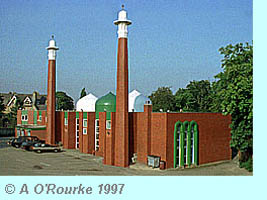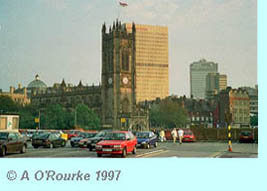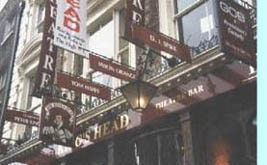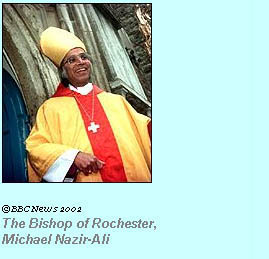Klaus Bung: The conversion
Length: 779 words = 3515 characters
Email: klaus.bung@tudo.co.uk
On 18 January 2002, the Archbishop
of Canterbury suggested that Muslims should read the Bible and Christians should
read the Koran. This was not necessarily an inspired idea. Klaus Bung's story
'The Conversion' has some bearing on this issue. In this story, one of two Muslim
twin brothers from Bradford becomes a Christian. Some years later the two meet
in order to decide once and for all which is the true faith. (Based on a German
story by Johann Peter Hebel.)
Klaus Bung:
The conversion
(with apologies to Johann Peter Hebel)
Two twin brothers, Yasin and Ali, lived in Bradford and worked
in their father's business in peace and harmony for many years, until Ali became
a Christian and Yasin remained a Muslim. From that day onward they tormented
each other as much as they could and their father's house was no more a house
of peace. Eventually the father could not stand the bickering any longer, and
he sent Ali to Liverpool where a business friend had offered him a job.
For many years there was no contact between Ali and Yasin,
and Ali did not feel like coming home even for Eid, for he had now embraced
the true faith, and he thought it was better to fast during Lent than during
Ramadan and to celebrate Easter rather than Eid.
But Ali felt lonely in the big city and especially away from
his brother, even though he now had the true faith and worshipped the right
God. So eventually he wrote a letter:
'Bhai, I have been thinking how sad it is that we don't have
the same religion and will not go to the same paradise, and perhaps to none.
If you can make me into a Muslim again, I will be content, and if I can turn
you into a Christian, that will be even better.'
Since Ali had to go to London on business and Yasin to Birmingham,
they agreed to meet in Manchester, which was on the crossroads. 'That's where
we will decide the issue.'
For several days they did not make any progress at all and
might as well have been in Stormont or Jerusalem. If Yasin said, 'God doesn't
have a son, that's blasphemy', Ali said, 'your Prophet had too many wives, and
he was an impostor'. If Ali quoted Saint Paul, Yasin said, 'I have nothing against
him but he wasn't Jesus and he wasn’t one of the companions of the Holy Prophet,
so what does he know!'
 But
come Thursday, Yasin was sharing his brother's bacon. 'Brother,' he said, 'Denmark
is not as wicked as I thought'. On Friday Ali joined his brother in the Central
Mosque for Namaaz-e-Juma'ah. 'Brother,' he said, 'your Imam doesn't chant so
badly after all.'
But
come Thursday, Yasin was sharing his brother's bacon. 'Brother,' he said, 'Denmark
is not as wicked as I thought'. On Friday Ali joined his brother in the Central
Mosque for Namaaz-e-Juma'ah. 'Brother,' he said, 'your Imam doesn't chant so
badly after all.'
 On Sunday they decided to go together first to the cathedral for Sung Eucharist
and then to Mosque for their namas. Then they would return home, listen to the
voice of God, and whatever He would tell them, they would do.
On Sunday they decided to go together first to the cathedral for Sung Eucharist
and then to Mosque for their namas. Then they would return home, listen to the
voice of God, and whatever He would tell them, they would do.
 But
when they returned to their hotel from Evensong and The King's Head, God admonished
them, but they did not realise it.
But
when they returned to their hotel from Evensong and The King's Head, God admonished
them, but they did not realise it.
 Ali
found an angry letter from his boss. 'This very instant you continue your trip
to London. I am not paying your wages so that you can attend the World Parliament
of Religions. You are not the Bishop of Durham and even less the Bishop of Rochester.
If you want to serve God, show our samples to our customers and do not talk
semantics.'
Ali
found an angry letter from his boss. 'This very instant you continue your trip
to London. I am not paying your wages so that you can attend the World Parliament
of Religions. You are not the Bishop of Durham and even less the Bishop of Rochester.
If you want to serve God, show our samples to our customers and do not talk
semantics.'
Yasin found a letter from his father: 'Bachá, come home
as fast as you can. Your mother is in hospital, I need your help in our shop,
and they are asking for you at Mosque.'
So they parted the same evening without having settled the
matter and each of them pondered what he had heard from the other.
Six weeks later Yasin wrote a letter to his brother: 'Dear
Brother, your arguments have convinced me. Now I am a Christian like you. Mother
doesn't mind, but Father is so angry that he never wants to see me again.'
Then Ali, overcome by pain and anger, rent his shirt and sent
his brother an e-mail: 'Oh you vessel of divine wrath, are you determined to
race towards damnation by renouncing the true faith? Yesterday I returned to
Islam.'
So it was that the Christian converted the Muslim, and the
Muslim converted the Christian; and everything went on as before except that
their resentment was greater.
Remember: Do not brood and speculate about religion, lest you
lose the strength of your faith. Do not argue with people of different religions,
least of all with people who know as little about it as you, and even less with
scholars, for they try to overpower you by their learning and the artifice of
their words and not by touching your heart. Instead live by your faith and do
not make simple things complicated -- unless your conscience drives you to change.
Note: This story is based
on, and partly translated from, the German story 'Die Bekehrung' (The conversion)
by Johann Peter Hebel (1760-1826)
Email: klaus.bung@tudo.co.uk
© 2002 Klaus Bung
Notes for translators
These notes are not meant for publication.
They are intended to help translators, especially those coming from very different
cultures. However, if a magazine editor wants to publish any of them
in conjunction with the story or use them to write an introduction, she is welcome
to do so.
- Bachá: 'my son'
(Urdu)
- bacon: Muslims are not
allowed to eat pork. As a result of a long tradition even the thought of it
fills them with genuine disgust, even more so than imagining somebody breaking
the prohibition of drinking alcohol.
- Bhai: 'brother' (Urdu)
- Bishop of Durham: Dr David
Jenkins (1925-....), one-time Bishop of Durham (until 1994), became famous for
many of his learned and unorthodox views which interpreted Christian doctrine
in a non-literalist way.
- Bishop of Rochester: Michael
Nazir-Ali, Anglican bishop of Rochester (still in that office in February 2002),
born in Pakistan of parents who converted from Islam to Roman Catholicism. As
a teenager he became an Anglican. Unlike David Jenkins conservative in his theological
outlook (e.g. sexual morality, family attitudes).
- blasphemy: The Koran condemns
the Christian teaching that Jesus is the 'son of God' as a blasphemy:
'... admonish those who say
that Allah has begotten a son. Surely of this they could have no knowledge,
neither they nor their fathers: a monstrous blasphemy is that which they utter.'
(Surah 18)
'Such was Jesus, the son
of Mary. That is the whole truth, which they are unwilling to accept. Allah
forbid that He Himself should beget a son!' (Surah 19: 90)
This is based on a literalist
interpretation of the word 'son': to beget a son, the father must have sexual
organs and must have used them in the traditional way. To imagine God engaged
in such a vulgar activity is what is blasphemous in the notion that Jesus is
the son of God. This interpretation ignores the fact that nowhere in the New
Testament, nor anywhere else in Christian theology, is it suggested that God
had sexual intercourse with the Virgin Mary, who, it is asserted, remained a
virgin even after giving birth to Jesus. This latter doctrine shows clearly
that the word 'son' does not have the usual anatomical implications.
- Bradford, town in Yorkshire
(England) with a large Muslim population
- companions: The companions
of the Holy Prophet (P.B.U.H.) were the first converts to Islam, who saw the
Holy Prophet in the flesh. The most famous of these were Abu Bakr, the first
Khalif, and Umar (Omar), the second Khalif.
- Denmark: Much of the bacon
consumed in England comes from Denmark.
- Easter: the highest-ranking
Christian festival, preceded by Lent, the period of fasting
- Eid: major Muslim festival
celebrated at the end of Ramadan
- Evensong: evening prayers
in the Anglican church
- house of peace: Dar-as-Salaam
- Imam: The Imam leads the
prayers at mosque.
- Jerusalem ('town of peace'):
the scene of many intractable conflicts and negotiations between Jews (Israelis)
and Muslims (Palestinians)
- Lent: the Christian forty
days of 'fasting'
- Namaas-e-Juma'ah: Namas
= 'prayer' (Urdu), juma'ah = 'Friday' (Urdu). Namaas-e-Juma'ah are the Friday
Prayers, the most important prayers of the week. Friday is the Muslim holy day.
- namas: 'prayers' (Urdu)
- Ramadan: the Muslim month
of fasting
- Saint Paul: author of the
oldest parts of the New Testament, and most successful proselytiser for Christianity.
- semantics: academic discipline
concerned with the meaning of words and language; popularly used in the sense
of 'splitting hairs'
- Stormont: seat of Parliament
in Northern Ireland, for years the scene of much bitter quibbling and unsuccessful
negotiations between Catholic and Protestant parties
- Sung Eucharist: Solemn
Sunday service in the Anglican church.
- The King's Head: popular
name for English pubs, where alcohol is consumed (a corresponding German name
is 'Der grüne Baum' [the green tree]).
- vessel of divine wrath:
(Romans 9:22), a person predestined for eternal damnation
- World Parliament of Religions:
a series of international assemblies of representatives of many religions begun
in Chicago in 1893, whose purpose it was to create greater understanding among
different religions.
 But
come Thursday, Yasin was sharing his brother's bacon. 'Brother,' he said, 'Denmark
is not as wicked as I thought'. On Friday Ali joined his brother in the Central
Mosque for Namaaz-e-Juma'ah. 'Brother,' he said, 'your Imam doesn't chant so
badly after all.'
But
come Thursday, Yasin was sharing his brother's bacon. 'Brother,' he said, 'Denmark
is not as wicked as I thought'. On Friday Ali joined his brother in the Central
Mosque for Namaaz-e-Juma'ah. 'Brother,' he said, 'your Imam doesn't chant so
badly after all.'  But
when they returned to their hotel from Evensong and The King's Head, God admonished
them, but they did not realise it.
But
when they returned to their hotel from Evensong and The King's Head, God admonished
them, but they did not realise it. 